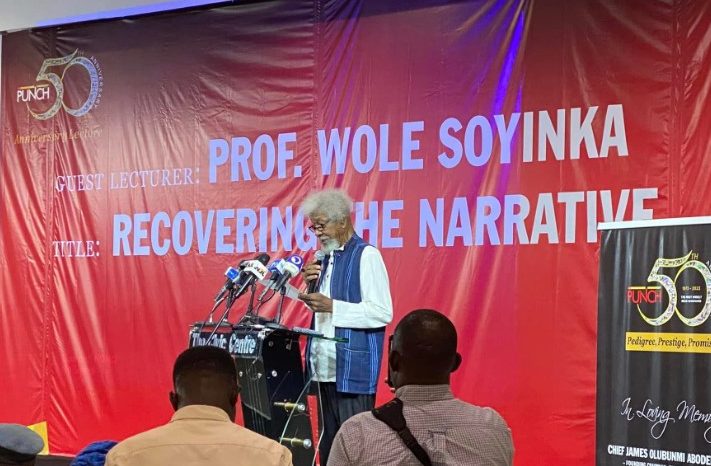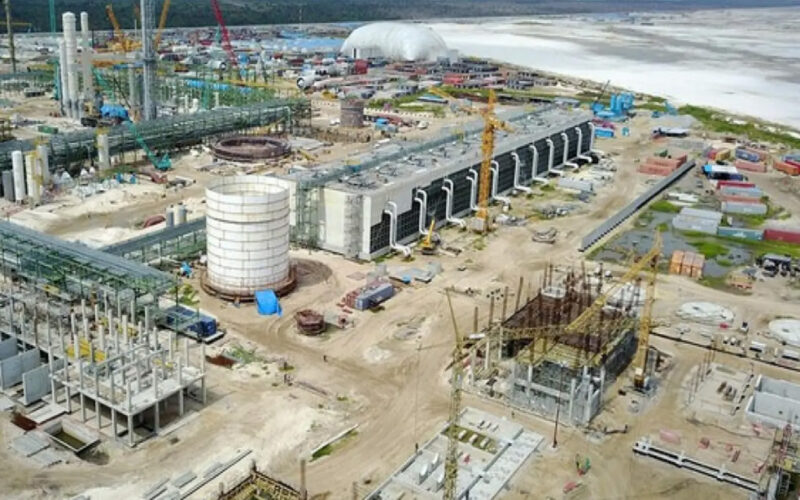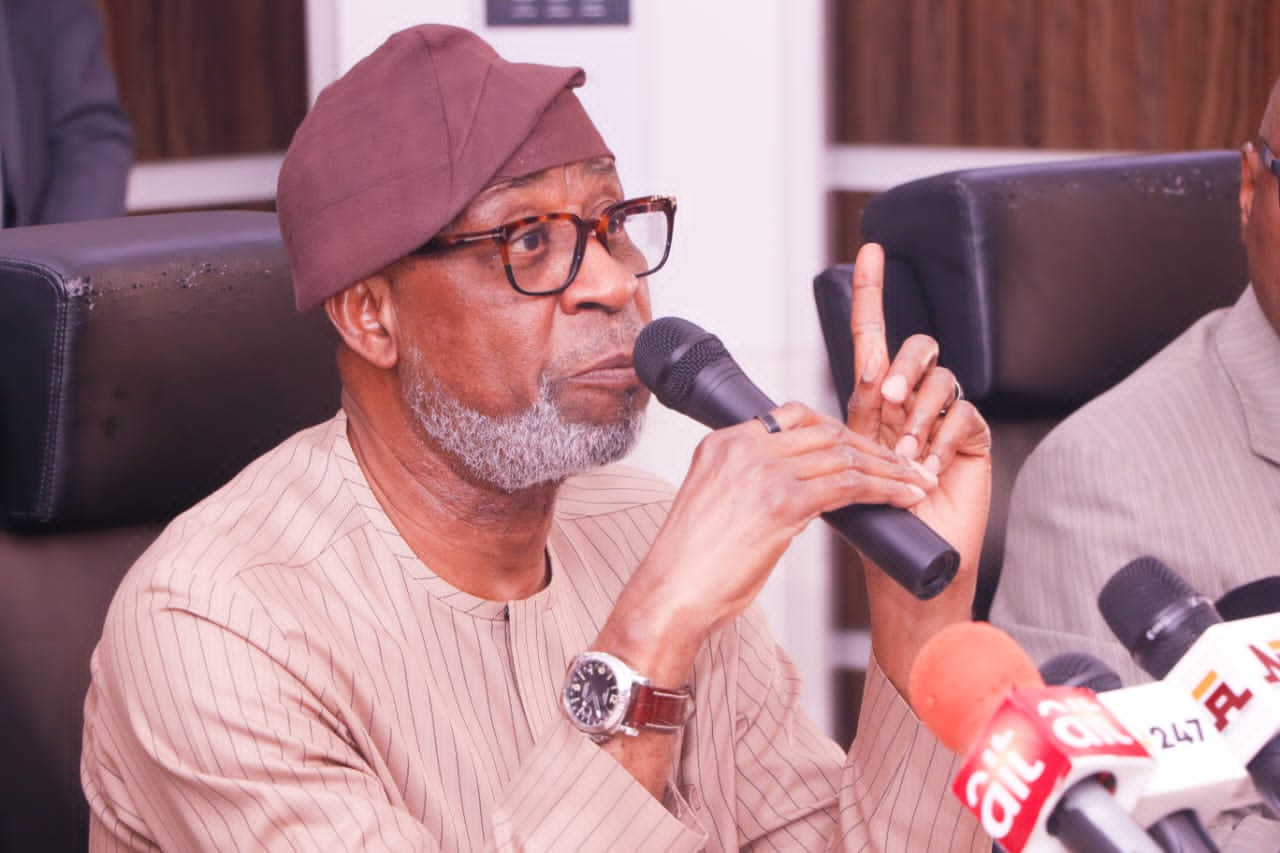News
Nigeria not working, it’s time to restructure, says Soyinka

Nigeria not working, it’s time to restructure, says Soyinka

Nobel laureate Prof. Wole Soyinka has called for decentralisation or restructuring to accelerate efforts towards nation building and ensure sustainable development.
He said Nigeria as currently constituted was not working and urgently required decentralization of the system to put it on the path of growth even as he noted that many Nigerian leaders recognised the importance of restructuring but failed to implement it.
Soyinka spoke on Thursday as a guest speaker at The Punch 50th Anniversary Lecture held in Lagos.
The lecture also in memory of Chief James Olubunmi Aboderin, the founding Chairman of the newspaper, who died on February 28, 1984, was attended by a former Minister of Transportation, Rotimi Amaechi; Special Adviser on Information and Strategy to the President, Bayo Onanuga, and a former presidential spokesman, Malam Garba Shehu, among others.
Soyinka said, “Certain facts, however, implicitly admit that the word has a number of common, pragmatic implications for both governance and the governed, that indisputable commonality being as follows: the present contraption is not working – neither economically, developmentally, nor even as a material expression of any functional social philosophy.
“Another is that those who come in power have indulged in pretend exercises in that direction, engaging the populace in totally phoney exercises – obviously just to ‘pacify the natives’. It is surely time that this demand be taken seriously, and addressed head-on.”
Although the Nobel laureate said restructuring might not be a magic wand to address all Nigeria’s challenges, it remained a precursor to nation building.
He said, “To anticipate accustomed banal responses, let me state quite clearly that no one has ever claimed that decentralisation – a precise word I personally prefer – will end hunger in the land or terminate religious conflicts and other forms of national malaise, no. We simply insist that this is central to the incomplete mission of – nation-being.
“It is essential to activities of basic existence such as food production, and access to such products. Palliatives remain crude, short-term, stop-gap measures only.
“As a veteran of food security working conferences from Uganda to India, from Paris to Sochi, I insist that, for a nation to be food self-sufficient, and sustainably, decentralisation is the key, not collectivisation.”
Soyinka also said there was no shortage of reasoned and implementable propositions in past conference papers.
“It is high time we stopped the cyclic distraction of re-inventing the wheel. The spokes are in place; the rims intact; only the will, not the wheel, is missing in action.
“The press, needless to urge, has a crucial role to play in this! However, be it noted that the press is only one of the enabling estates – all arms of governance, most pertinently, at the state level, have a propulsive, even commanding role to play in the effort.
“Repeatedly, backed by constitutional authorities, both publicly and privately, we have pointed out to them that there is sufficient constitutional leeway in the present protocols of association – if I may quote myself unapologetically – to ‘push the envelope as far as it can go without actually bursting’ – if the centre continues to shirk away from this now strident imperative.
“I repeat that wearisome call yet again. There can be no further evasion.
“That assertion is made both as a general principle of socio-political volition that is fundamental to any free, truly liberated people, and as an informed response to the actualities in which we struggle to exist as a sentient people, responsive to the exigencies of daily manifestation of change.”
Minister of Information and National Orientation, Muhammed Idris, commended Soyinka’s fatherly role in nation building.
He also said, “The Punch has been here for 50 years, and what that tells you is that it’s a story of resilience, trust, hard work, and commitment to the Nigeria project. These are the exact virtues President Bola Tinubu upholds.
“Nigeria is going through hard times now, but it’s not new and it’s not peculiar to this country.
“All the issues we are discussing now are issues other countries are discussing. A few weeks ago, we heard that the United Kingdom had gone into an economic recession.
“President Tinubu has taken very bold steps. The first day after he assumed office, he took away fuel subsidy. Before he assumed office, the economy was a dead horse standing.
“So, whether the subsidy is removed or not, the economy is going to be challenging. He ensured that the subsidy went away for the benefit of all.
“We knew from day one that it’s not going to be an easy sail, but we are seeing the effects of the decision, and the good story is that the government is taking very pro-active decisions to ensure that we turn the corner and Nigeria’s economy bounce back again.
“All these things happening are for the good of the country, and the economy is going to bounce back. We foresee a situation where, in another year, this country is going to get better.”
The Punch Chairman, Mrs Angela Emuwa, said the theme “Recovering the narrative” was a call to action in shaping the future all Nigerians would be proud of.
She said, “As the most widely read newspaper in the nation, PUNCH has not only been a witness to history but a key player in shaping narratives.
“Our 50-year resilience is a testament to the power of the press in influencing positive change, upholding the values of democracy, and championing the cause of the people.
“We hope that the impact of our 50-year journey will serve as a source of inspiration to all. We have weathered storms, stood against oppression, championed the cause of justice, and yet we remain unbowed and unbroken.”
The event had in attendance media executives, captains of industry, academics, leaders of thought, and security chiefs, among others.
News
FG to give full operating licence to Dangote

FG to give full operating licence to Dangote
The Nigerian Midstream and Downstream Petroleum Regulatory Authority (NMDPRA) has announced that the commissioning of the 650,000 barrels per day Dangote Petroleum Refinery is imminent. Furthermore, the Authority will soon grant the refinery an operational license.
This announcement was made by NMDPRA’s Chief Executive, Engr. Farouk Ahmed, during a stakeholders’ forum in Abuja, where he revealed that only three refineries currently possess valid licenses.
“We have issue three refineries with three valid licences. We awarded to Dangote Refinery even in their pre- commissioning and sooner than later they will have full commission and a valid license to also operate,” he said.
Ahmed also noted that about 15 gas facilities have valid licences while more were undergoing processing.
According to him, there are 1,199 facilities with valid licences in the downstream.
He also said there are more than 176 operators, who hold gas import permits.
READ ALSO:
- Rampaging cultists gun down SUG official, one other in Edo
- Finally, Port Harcourt-Aba train service begins with four-day free ride
- ICPC tracks N219.84bn in MDAs, constituency projects
The Authority Chief Executive also noted that there are 130 depots with valid licences while 69 hold valid coastal vessels licences.
In terms of retail, Ahmed said NMDPRA has licensed 9,464 retail outlets as at 10:00am yesterday.
His words: “In the gas processing facility, within the midstream, there are about 15 of them with valid licenses. And much are under processing.
“If you go to the downstream, in the gas state of the downstream, there are facilities more that 1,199 facilities are with NMDPRA valid licences. More than 176 operators hold gas import permits. In the liquid licensing side of the downstream, there are 130 depots with valid licenses, coastal vessels of more than 69 valid licenses as at today.”
The CEO of NMDPRA emphasized the importance of including midstream and downstream operations in the Host Community framework, as they are impacted by emissions and effluence. He used the examples of the Dangote Petroleum Refinery and NLNG to illustrate the scope of emissions.
He presented data on midstream and downstream operations to help stakeholders understand their reach and encouraged them to provide input on which facilities should be included in the Host Community and the criteria for doing so. The forum was organized to gather stakeholders’ ideas and feedback.
FG to give full operating licence to Dangote
News
ICPC tracks N219.84bn projects in 176 MDAs

ICPC tracks N219.84bn projects in 176 MDAs
The Independent Corrupt Practices and Other Related Offences Commission, ICPC, has tracked N219.84 billion to contractors and ministries, departments and agencies, MDAs, of the federal government.
The Chairman of the ICPC, Musa Adamu Aliyu, SAN, who disclosed this at a briefing in Lagos yesterday, said the tracking focussed on critical sectors such as education, agriculture, healthcare and infrastructure which he added, spanned 26 states and the Federal Capital Territory, FCT, across all six geo-political zones of the country.
“The Constituency and Executive Projects Tracking Group (CEPTG) has tracked a total of N219, 843,922,945.48 across 176 ministries, departments, and agencies, MDAs, since its inception in 2019.
READ ALSO:
- Nigeria’s solid minerals worth over $750bn — Minister
- Lagos cleric, 45, docked for raping 22-year-old lady
- Senate begins moves to harmonise NIN, BVN, other identity platforms
‘’The initiative is to ensure government funds are directed towards impactful projects that benefit the most vulnerable Nigerians,’’ he said.
According to the ICPC boss, the phase 6 tracking which commenced in November 2023 and continued through the first quarter of this year, is ongoing.
He said: “Finally, we want to assure Nigerians that ICPC, in the discharge of its enforcement mandate, is committed to adherence to the rule of law and international best practices in the investigation and prosecution of persons suspected to have committed corrupt practices.’’
The CEPTG, conceived in April 2019 as a preventive and intervention measure, is initiated to tackle corruption and, among other things, engender good governance, transparency, and accountability within the body polity. It focuses on how well monies allocated to critical sectors by the government are utilised.
Highlighting the findings from Phase 6 tracking, the commission’s chairman said a total of 1,721 government-funded projects were tracked within the Phase 6 tracking cycle.
ICPC tracks N219.84bn projects in 176 MDAs
News
Nigeria’s solid minerals worth over $750bn — Minister

Nigeria’s solid minerals worth over $750bn — Minister
The Minister of Solid Minerals Development, Dele Alake, revealed a preliminary report by German firm GeoScan that estimates Nigeria’s solid minerals are worth $750 billion. He highlighted this during a summit organized by the National Institute for Policy and Strategic Studies (NIPSS) and Bruit Costaud, emphasizing the sector’s potential contribution to Nigeria’s goal of achieving a trillion-dollar economy.
Alake noted President Bola Ahmed Tinubu’s commitment to reforms in the mining sector to prevent Nigeria from merely being a mining pit for solid minerals. He stressed the importance of data availability to attract investors and stimulate job creation and economic growth through mineral processing plants.
“We are working with the World Bank, Excalibur and GeoScan, a German company, to get the necessary data on the sector. That is why the federal government signed a memorandum of understanding with Geoscan, and they did a preliminary survey of our minerals’ output and potential. They gave us a figure of $750bn worth of minerals embedded under the ground of Nigeria.”
READ ALSO:
- Lagos cleric, 45, docked for raping 22-year-old lady
- Senate begins moves to harmonise NIN, BVN, other identity platforms
- Pregnant woman among nine people injured in Lagos gas explosion
Collaborations with organizations like the World Bank, Excalibur, and GeoScan aim to gather essential data for the sector. The memorandum of understanding signed with GeoScan resulted in a preliminary survey revealing the substantial value of Nigeria’s mineral resources.
Nasarawa State Governor Abdullahi Sule highlighted the importance of investing in solid minerals, particularly citing the significance of lithium, which he likened to gold. He announced the impending commissioning of Nigeria’s largest lithium processing factory, expected to process 4,000 metric tons daily and transport over a million tons of lithium annually.
Ayo Omotaya, Director General of NIPSS, reiterated the summit’s purpose of charting a path forward for the mining sector, underscoring the necessity of strategic planning and collaboration to harness Nigeria’s mineral wealth.
Nigeria’s solid minerals worth over $750bn — Minister
-

 metro11 hours ago
metro11 hours agoLabour Day: Nigerian workers are dedicated, resilient, says NURTW leader
-

 Education2 days ago
Education2 days agoBREAKING: JAMB releases 2024 UTME results
-

 News2 days ago
News2 days agoSeun Kuti retracts allegation on P&ID fraud, tenders apology
-

 News2 days ago
News2 days agoTerrorist negotiator Tukur Mamu seeks transfer out of DSS custody to Kuje prison
-

 metro2 days ago
metro2 days agoSix terrorists surrender to troops in Lake Chad
-

 Sports2 days ago
Sports2 days agoFinidi George appointed Super Eagles head coach
-

 metro2 days ago
metro2 days agoBREAKING: Suspected herders kill 3 mourners, farmers in Enugu
-

 News2 days ago
News2 days agoGanduje probe: Kano commission invites public for information




















